- Home
- Nathan Lowell
By Darkness Forged (Seeker's Tales from the Golden Age of the Solar Clipper Book 3)
By Darkness Forged (Seeker's Tales from the Golden Age of the Solar Clipper Book 3) Read online
This book and parts thereof may not be reproduced in any form, stored in a retrieval system, or transmitted in any form by any means—electronic, mechanical, photocopying, or otherwise—without prior written permission of the publisher, except as provided by the United States of America copyright law.
This is a work of fiction. Names, characters, places and incidents are products of the author’s imagination or are used fictitiously. Any similarity to actual persons, organizations, and/or events is purely coincidental.
Visit us on the web at: www.solarclipper.com
Copyright © 2018 by Nathan Lowell
Cover Art J. Daniel Sawyer
First Printing: December, 2018
Books in
the Golden Age of the Solar Clipper Universe
Trader's Tales
Quarter Share
Half Share
Full Share
Double Share
Captain’s Share
Owner’s Share
Smuggler's Tales
Milk Run
Suicide Run
Home Run
Seeker's Tales
In Ashes Born
To Fire Called
By Darkness Forged
Shaman Tales
South Coast
Cape Grace*
Fantasy by Nathan Lowell
Ravenwood
Zypheria’s Call
The Hermit of Lammas Wood
* Forthcoming
Table of Contents
Chapter 1 Port Newmar: 2376, January 13
Chapter 2 Newmar System: 2376, January 16
Chapter 3 Newmar System: 2376, January 20
Chapter 4 Newmar System: 2376, January 20
Chapter 5 Newmar System: 2376, January 20
Chapter 6 Mel’s Place: 2376, February 1
Chapter 7 Mel’s Place: 2376, February 1
Chapter 8 Mel’s Place: 2376, February 1
Chapter 9 Mel’s Place: 2376, February 2
Chapter 10 Mel’s Place: 2376, February 2
Chapter 11 Mel’s Place: 2376, February 2
Chapter 12 Mel’s Place: 2376, February 3
Chapter 13 Mel’s Place: 2376, February 3
Chapter 14 Telluride System: 2376, February 10
Chapter 15 Telluride Station: 2376, February 20
Chapter 16 Telluride Station: 2376, February 24
Chapter 17 Telluride System: 2376, February 24
Chapter 18 Deep Dark: 2376, February 25
Chapter 19 Dark Knight Station: 2376, March 11
Chapter 20 Dark Knight Station: 2376, March 11
Chapter 21 Dark Knight Station: 2376, March 11
Chapter 22 Dark Knight Station: 2376, March 11
Chapter 23 Dark Knight Station: 2376, March 11
Chapter 24 Dark Knight Station: 2376, March 11
Chapter 25 Dark Knight Station: 2376, March 12
Chapter 26 Dark Knight Station: 2376, March 12
Chapter 27 Dark Knight Station: 2376, March 12
Chapter 28 Dark Knight Station: 2376, March 12
Chapter 29 Dark Knight Station: 2376, March 12
Chapter 30 Dark Knight Station: 2376, March 12
Chapter 31 Dark Knight Station: 2376, March 12
Chapter 32 Dark Knight Station: 2376, March 12
Chapter 33 Deep Dark: 2376, March 12
Chapter 34 Deep Dark: 2376, March 14
Chapter 35 Telluride System: 2376, March 20
Chapter 36 Telluride System: 2376, March 22
Chapter 37 Dark Knight Station: 2376, March 25
Chapter 38 Dark Knight Station: 2376, March 26
Chapter 39 Dark Knight Station: 2376, March 26
Chapter 40 Port Newmar: 2376, May 15
Chapter 41 Port Newmar: 2376, May 15
Chapter 42 Port Newmar: 2376, May 15
Chapter 43 Port Newmar: 2376, May 17
Chapter 44 Port Newmar: 2376, May 17
Chapter 45 Port Newmar: 2376, May 17
Chapter 46 Newmar Orbital: 2376, May 19
Chapter 47 Newmar System: 2376, June 3
About The Author
To William Cruz Carroll, Sr.
A great fan,
a dedicated player of games that I like,
and a good friend.
Chapter 1
Port Newmar: 2376, January 13
Malloy Gaines lounged in his chair, waiting for my answer.
“A snake doesn’t miss his skin,” I said.
Gaines merely tilted his head a degree to the left.
“It’s a snake,” I said. “It lacks the higher cognitive function.”
Gaines’s lips lifted at the corners, just a smidgen. Not enough to really be a smile but enough to tell me he wasn’t buying it.
I looked around his office, taking in the framed degree above the desk tucked into the corner. A rack of cushions took up most of the space in another corner. We sat facing each other in the center of the room, an oblong rug marking the ring we verbally sparred in.
“What are you thinking, Ishmael?”
“I never thought of us as sparring before.”
He gave a short, surprised laugh. “Are we sparring?”
I shook my head. “I don’t know. I just noticed the layout. The rug as our ring.”
He glanced around and nodded. “I can see that. Do you see us as adversaries?” He leaned forward in his chair and rested his elbows on his knees.
“No,” I said. “It just struck me as odd and you asked what I was thinking.”
“So, maybe you can take off the gloves?” he asked. “Maybe cut out the ducking and weaving a little?”
“A snake sloughs off its skin because it doesn’t fit,” I said. “They just leave it behind because it’s of no use.”
“That wasn’t so hard, was it?”
I felt myself shrugging. “People aren’t snakes.”
He sat back. “No. People aren’t snakes. Your mother was a literature professor?”
“I get the metaphor, if that’s what you’re asking.” I leaned back in my seat and looked at the overhead. “My past is a snake’s skin. It’s actually healthy for me to leave it behind.”
“Some of it,” Mal said. “Some of it is part of you. You can’t leave it behind any more than you’d leave behind a foot.”
“A snake only sheds the part that doesn’t fit.”
He grinned. “Go on.”
“I have to figure out what parts don’t fit.”
“Snakes have it easier,” he said. “When are you shipping out again?”
“Two days.”
He nodded. “Not much time.”
“I don’t get paid unless I deliver.”
He raised an eyebrow. “That’s your excuse?”
“Not really. I just feel better underway.”
“Planets bog you down?”
“It’s not that so much. I just feel more focused out there.”
He frowned a little. “We have a couple of ticks. Talk about that.”
“About what?”
“Focus. Why do you feel more focused there?”
“Fewer distractions. I’ve a ship to run. Something to do.”
“You could take up knitting,” Gaines said. “What about being out there is different?”
“It’s the only thing that matters. Making a mistake means people die.”
“People die everywhere,” he said, settling back into his seat again and peering at me across the narrow gap. “You feel differently out ther
e than you do here.”
“Yeah, I do. It’s hard to explain.”
“Try.”
“I’ve got a job. I’ve got focus. I get satisfaction out of delivering goods, earning value for the company.”
“Is that who you are? A delivery guy?”
The words stung a little but I saw where he was going. I paused for more than a few heartbeats to consider the question. “I guess that’s true.”
“Is that who you want to be?”
I leaned back again to stare at the overhead. “I don’t know.”
“Have you always felt this way? Like a delivery guy?”
“I don’t know that I feel like a delivery guy now.” I pulled my gaze down from the acoustic tiles above.
“What do you feel like?” he asked.
I stared back at him. I didn’t have an answer.
“That’s the problem, isn’t it?” he asked.
“Yeah. I think so. I’ve always had this sense of purpose. In the beginning it was just to survive. To keep from being ground up by the gears of commerce.”
“Poetic. You’re talking about Neris?”
“Pretty much. After that—on the Lois—it was always improving my chances for the next job. Getting the next rating.”
“But you were still almost put ashore,” Gaines said.
“I was.”
“Then you went to the academy and graduated into the meat grinder.”
“Yeah. I was pretty green. I’ve seen it happen to others enough that I can see it in myself now.”
“Were you happy?” he asked.
“Happy?” The idea seemed foreign, a concept that had no roots in reality. Was I happy on the Lois? The Tinker?
“I see the wheels turning in your head but you’re not talking,” he said. “Let it out.”
“I don’t know,” I said. “I’m actually a little distressed that I don’t know.”
“Think back to the early days on the Lois McKendrick. Give me some words.”
“Scared. Fun.”
“Anything else?” he asked. “Challenged, maybe?”
“Well, yeah.”
“What about now? Are you challenged?”
I sighed. “Not as such. No. We have our moments of terror, but daily? No.”
“Why is that?”
“I’m the captain. I have people to run the ship and my job is to stay out of their way.”
“That your rule?”
“That’s my role. Where are you going with this?”
Gaines steepled his fingers in front of his mouth. “You’re bored.”
“I’m—” I started to argue with him but bit down on the thought. “I’m the captain.” It sounded weak, even to me.
“What’s that mean?” he asked. “Not the regulation answer. To you. What’s that mean? The captain.”
“I’m in charge. I make the final decisions.”
“How many final decisions are there in your average day?”
“I don’t know.”
“You have people to do that,” he said. It wasn’t a question.
“Yes.”
“Answer without thinking. What was your favorite ship?”
“Agamemnon.”
He grinned. “Now, why?”
“I don’t know. I answered without thinking.”
“Think now. Why Agamemnon?”
“It was my first command.”
“What made it fun?”
“The crew,” I said. “Definitely the crew.”
“Why? Were they really good?”
“They were a lot better than they thought. Getting them to change that was a tremendously gratifying challenge.”
“What about the Tinker?” he asked.
“What about it?” I shook my head. “The before and after there was night and day. Not even the same ship.”
“You worked up to captain there, right?”
“Yeah. Went aboard as a green third mate out of the academy and left after Fredi deGrut retired. Her replacement left the opening on the Agamemnon for me to move up to captain.”
“Back to the Tinker. How do you feel about the early Tinker?”
“That was horrible. I was an idiot. I probably should have been cashiered for insubordination.”
“Why?”
“I thought I knew all the answers and I was arrogant enough to spout them.”
“Did you?”
“Spout them? Yes. Actually know them?” I shook my head and sighed. “No. I knew my answers and assumed they applied to the ship. They didn’t. For all that Burnside was an ass—and a dangerous ass, at that—he followed the letter of the regulations for running the ship. He violated the spirit every day and his misogyny blew every idea of crew management I ever believed in right out the air lock.”
“But?”
“But?” I asked.
“But what about Burnside? Do you agree with him now?”
“Oh, hell no. I couldn’t treat people like that. His duties? Yeah. I was wrong in a lot of ways but every ship has its own culture. You mess with that at your peril. That was true even on the Lois.”
“But Alys Giggone’s culture wasn’t Frederica deGrut’s, was it?”
I had to think about that for a few heartbeats. “Not exactly. No. Each captain brought their own culture to the ship.”
“Perfect,” Gaines said, grinning at me. “Generalize that statement.”
“What?”
“Make it a generalization about captains.”
“All captains bring their own cultures to their ships?” I asked.
His grin widened. “What sense did you take to the Agamemnon?”
I shrugged. “I don’t really know. The ship had a bad reputation. Bad actors in the crew. Marginal officer corps.”
“You didn’t believe it,” Gaines said.
“Let’s just say I was skeptical.”
“Why?”
“Reputations are tough. Once you blow it, it’s really hard to get it back. You don’t even have to really be what the reputation says you are. Once enough people believe it, you’re stuck digging your way out of a hole you may not have made to begin with.”
“Bitter voice of experience?”
“Not really,” I said. “Just observed it enough growing up in the university enclave on Neris.”
“Why didn’t you believe with Agamemnon?”
“At first, I’m not sure I didn’t believe. They were supposed to be the worst ship in the fleet. I was ready to go and clean house the way Fredi had with the Tinker. It was the chance for my first command. The next step on the ladder.”
“How fast did you change your mind?”
“When I saw the ways the crew acted out. Those guys—and it was all guys when I took over—those guys were just acting out. Not acting up. Everything they did, they did to get a rise out of the first mate. They were brilliantly diabolical.”
“Why the first mate?”
“I wondered that, too, until I met the captain.”
“What about him?”
“He wasn’t there. He didn’t understand his crew—or even have much to do with them.” I stopped.
“Don’t stop now. You’re on a roll,” Gaines said.
I took a deep breath. “He was only the guy who lived in the ship’s cabin. He meted out punishments.” My stomach felt like I’d just filled it with ice water and acid.
“So the crew acted up,” Gaines said, spearing me with his gaze. “Because Delman had people to run the ship for him while he stayed out of the way? He made the big decisions? Is that what you’re saying?”
I couldn’t seem to find my voice. I just nodded.
“Something to consider, eh?” Gaines said. “You ready for some homework?”
“I’m not sure. It feels like I just took a punch in the gut.”
“You did,” he said. “First part of your homework is to think about your life on the Lois McKendrick. Ask yourself the question ‘How did it make you feel?’”
�
��How did it make me feel?”
He shook his head. “Second person, as if you were asking somebody else.”
“How did it make you feel?” I asked.
“Just like that. You said it was fun, challenging. Remember what it felt like. Having fun, rising to the challenges. Being scared.” He paused. “Try it now. Close your eyes. Remember the mess deck on the Lois. Remember the sounds, the smell. Ask yourself silently.”
I did as he instructed.
“Don’t answer the question,” he said. “Just ask it.”
Emotions bubbled just under my heart. A strong sense of belonging. Of gratitude. “How do I not answer the question?” I asked, my eyes still closed.
“Oh, you’ll answer it,” he said. “Just try not to. Let the feelings wash over you. Different days will give you different feelings. Just feel them. Think of different parts of that experience. Sometimes focus on a face. Sometimes a sound or a smell. Just notice the feelings but don’t try to name them, categorize them. Just feel them.”
I let the question loose in my head again and tried to remember how it felt.
“Now,” he said.
I opened my eyes, surprised at the sudden transition. Like I’d been asleep and woke up suddenly. I blinked several times, trying to find my focus.
“Now,” he said, more gently the second time. “Culture. Remember that?”
“Yeah. Every captain brings their own culture.”
“What culture did you bring to the Agamemnon?”
I shrugged my head. “Acceptance? Inclusion? I don’t know how to classify cultures.”
“Usually they have a collection of shared values. A shared aesthetic.”
“Profit,” I said. “We focused on the bottom line. Ran a contest, even.”
Gaines raised that one eyebrow again. “But you found your first mate was nearly deaf and got her some help.”
I shrugged. “Well, of course. She was hardly effective when she couldn’t hear what people were saying.”
“So it was profit that made you have her hearing checked?”
“I thought she had some good skills,” I said. “I hated to see her miss out.”
“And the cargo officer? Wyatt?”
“You’ve done a lot of homework on a patient you only see once in a blue moon.”

 By Darkness Forged (Seeker's Tales from the Golden Age of the Solar Clipper Book 3)
By Darkness Forged (Seeker's Tales from the Golden Age of the Solar Clipper Book 3)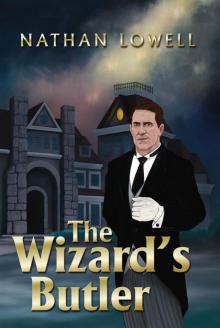 The Wizard's Butler
The Wizard's Butler Cape Grace
Cape Grace By Darkness Forged
By Darkness Forged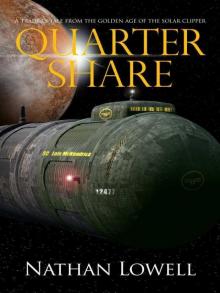 Quarter Share
Quarter Share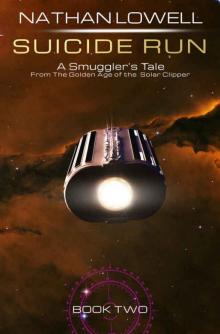 Suicide Run (Smuggler's Tales From the Golden Age of the Solar Clipper Book 2)
Suicide Run (Smuggler's Tales From the Golden Age of the Solar Clipper Book 2)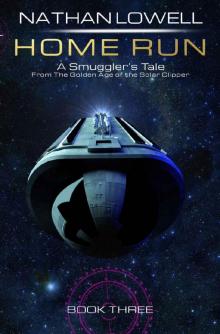 Home Run (Smuggler's Tales From the Golden Age of the Solar Clipper Book 3)
Home Run (Smuggler's Tales From the Golden Age of the Solar Clipper Book 3) To Fire Called (A Seeker's Tale From The Golden Age Of The Solar Clipper Book 2)
To Fire Called (A Seeker's Tale From The Golden Age Of The Solar Clipper Book 2)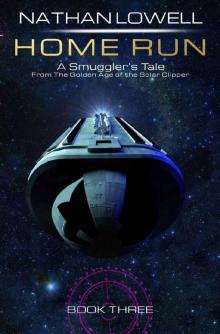 Home Run
Home Run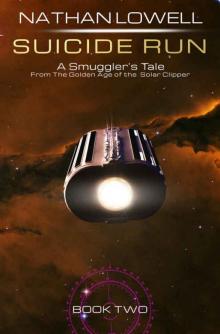 Suicide Run
Suicide Run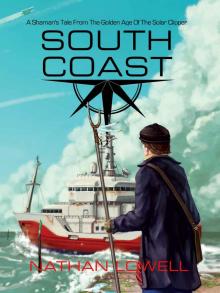 South Coast (Shaman's Tales From The Golden Age Of The Solar Clipper Book 1)
South Coast (Shaman's Tales From The Golden Age Of The Solar Clipper Book 1) Milk Run (Smuggler's Tales From The Golden Age Of The Solar Clipper Book 1)
Milk Run (Smuggler's Tales From The Golden Age Of The Solar Clipper Book 1) Ravenwood (Tanyth Fairport Adventures)
Ravenwood (Tanyth Fairport Adventures) Captain's Share (Trader's Tales from the Golden Age of the Solar Clipper)
Captain's Share (Trader's Tales from the Golden Age of the Solar Clipper) Owner's Share (Trader's Tales from the Golden Age of the Solar Clipper)
Owner's Share (Trader's Tales from the Golden Age of the Solar Clipper)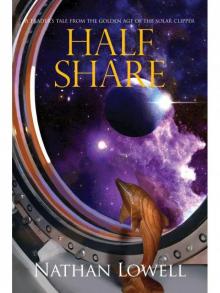 Half Share
Half Share The Hermit of Lammas Wood
The Hermit of Lammas Wood Ravenwood
Ravenwood Full Share
Full Share A Light In The Dark (Tales of the Deep Dark)
A Light In The Dark (Tales of the Deep Dark)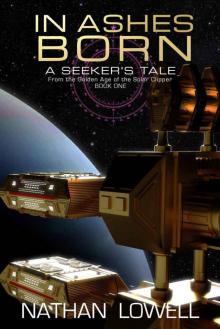 In Ashes Born (A Seeker's Tale From The Golden Age Of The Solar Clipper Book 1)
In Ashes Born (A Seeker's Tale From The Golden Age Of The Solar Clipper Book 1) Double Share: Solar Clipper Trader Tales
Double Share: Solar Clipper Trader Tales Zypheria's Call (A Tanyth Fairport Adventure)
Zypheria's Call (A Tanyth Fairport Adventure)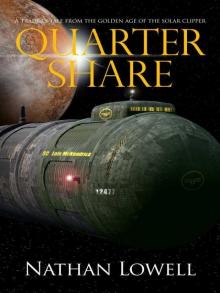 Quarter Share attftgaotsc-1
Quarter Share attftgaotsc-1